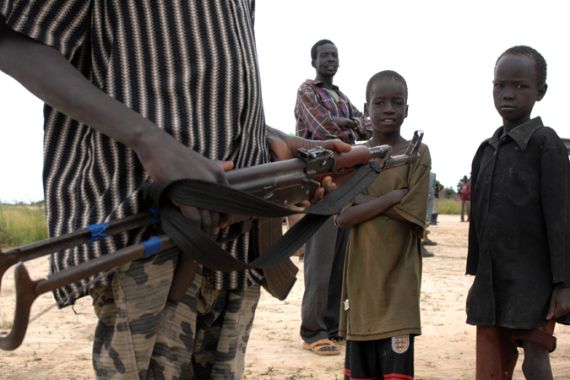Militia blamed for Sudan ‘massacre’
South Sudan minister accuses officer who lost governorship vote last year of orchestrating carnage in Jonglei region.

 |
| South Sudan’s army said the scale of the killings emerged after searches found bodies of women and children [EPA] |
A cabinet minister has accused a renegade militia in Southern Sudan’s Jonglei oil state of killing at least 211 people, doubling earlier estimates of the death count.
Making the announcement on Tuesday in Juba, the capital of south Sudan, James Kok Ruea, the humanitarian affairs and disaster management minister, called the killings a “massacre”.
Renewed violence has sparked concerns for the security of the underdeveloped south where voters last month overwhelmingly voted to declare independence from the north in a referendum.
Ruea said 201 southern civilians and security forces died during the attack in Jonglei state – where French oil group Total leads a consortium controlling a largely unexplored oil concession – and that 10 died later in the hospital.
He said nearly 160 of the dead were civilians, including children, the elderly and the internally displaced.
“They were chased into the river. I was the one who put them into a mass grave,” an emotional sounding Ruea told The Associated Press news agency.
Pagan Amum, secretary-general of the south’s ruling Sudan People’s Liberation Movement (SPLM), repeated accusations that the north was trying to destabilise the south by arming militias – but stopped short of directly implicating northern government figures.
“It was a massacre of our people and it is really very painful,” he said. “We are a society that is traumatised … Guns are in a lot of hands.”
South Sudan’s army said forces loyal to George Athor, a renegade army officer who launched a revolt after losing in last year’s elections, carried out attacks in Jonglei last week.
Khartoum accused
Army and government officials on Tuesday told the Reuters news agency the scale of the killings emerged after searches found bodies of women, children and other civilians still lying in remote areas.
“Today armed groups are being financed, being armed, being sent into southern Sudan from the north,” Amum said.
“You know that George Athor who just caused the massacre in Fangak, his guns are coming from Khartoum.”
Rabie Abdelati, a senior member of the north’s dominant National Congress Party (NCP), denied the accusation.
“Athor’s is a southern group and there is no connection between the NCP and Athor,” he told Reuters.
Last month’s referendum was promised in a 2005 peace deal that ended decades of civil war between the mostly Muslim north and the south where most follow Christianity and traditional beliefs.
The referendum was largely peaceful and the NCP, led by Omar Hassan al-Bashir, the Sudanese president, said it accepted the result. The south is due to secede on July 9.
The latest killings underline the deep ethnic and political divides that remain in the south. Death counts topping 100 were reported in a spate of clashes between tribal groups and militias in 2009 and early 2010.
Athor was a senior member of the then rebel southern army during the civil war. He stood for the governorship of Jonglei as an independent in last year’s general elections and took to the bush after losing, accusing the SPLM of fraud.
Two million people were killed and four million fled during the civil war fought over ideology, oil, ethnicity and religion.
The fighting also set southern tribe against southern tribe, with the north backing militias from rival ethnic groups.